The Cold Edge of Forever, I: Equations
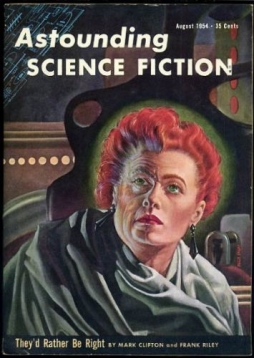 I want to write about Star Trek. Specifically, about the episode “The City on the Edge of Forever.” But I’m not going to do that right now. I’ll get there, but I’m going to start off by writing about a well-known prose sf story that to me parallels “City” in some interesting ways. Then, in my next post, I’ll go on to write about the Trek episode and make a fuller comparison (edit to add: time having passed, you can find the post here). First up, though: “The Cold Equations.”
I want to write about Star Trek. Specifically, about the episode “The City on the Edge of Forever.” But I’m not going to do that right now. I’ll get there, but I’m going to start off by writing about a well-known prose sf story that to me parallels “City” in some interesting ways. Then, in my next post, I’ll go on to write about the Trek episode and make a fuller comparison (edit to add: time having passed, you can find the post here). First up, though: “The Cold Equations.”
“The Cold Equations” was written in 1954 by Tom Godwin for editor John W. Campbell and published in Astounding. Some, including writers Kurt Busiek and Lawrence Watt-Evans, have stated that the story was largely borrowed from an EC Comics short story by Al Feldstein with art by Wally Wood, “A Weighty Decision,” itself perhaps copied from an E.C. Tubb story (“Precedent”). At any rate, Godwin’s tale is well-known, having been adapted for the screen and frequently anthologised; I read it in The Road to Science Fiction 3: From Heinlein to Here.
A man, Barton, piloting a small spaceship carrying medicine to an isolated colony, discovers an eighteen-year-old stowaway, Marilyn, who wanted to see her brother on the colony world. But Marilyn, from Earth, doesn’t understand the way things work out on the frontier of space: the ship had exactly as much fuel as it needed to get to the planet — before Marilyn’s unexpected weight was added. With Marilyn, it won’t be able to land safely. For the people on the colony world to live, she has to be ejected from the ship. Barton frantically tries to find some way out, some way to keep her alive, but cannot; and so, willingly, she goes into the airlock, and dies out in the void of space. Physics and mass and momentum cannot be argued with, the story tells us; the cold equations must balance.
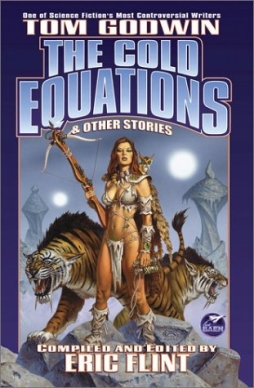 There is much that can be said about the story and much has been. I’ve read only a tiny fraction of the criticism it’s sparked; there’s a good piece here and recently there was a thoughtful set of posts about the story (and reactions to his arguments about the story) by Paul Kincaid, which can be found here, here, here, and here. “The Cold Equations” is one of those puzzling works that’s not necessarily a success in terms of sheer craft, but which still has the power to affect at least some of the readers who see it as flawed. Even if you think the characters are flat and the prose is at best functional, it can still be an affecting story. As Kincaid notes, there’s something iconic about it. It seems to me that the story reduces science fiction as a whole down its barest essence: a protagonist, a spaceship, and a problem.
There is much that can be said about the story and much has been. I’ve read only a tiny fraction of the criticism it’s sparked; there’s a good piece here and recently there was a thoughtful set of posts about the story (and reactions to his arguments about the story) by Paul Kincaid, which can be found here, here, here, and here. “The Cold Equations” is one of those puzzling works that’s not necessarily a success in terms of sheer craft, but which still has the power to affect at least some of the readers who see it as flawed. Even if you think the characters are flat and the prose is at best functional, it can still be an affecting story. As Kincaid notes, there’s something iconic about it. It seems to me that the story reduces science fiction as a whole down its barest essence: a protagonist, a spaceship, and a problem.
But then two of those elements are gendered — the protagonist’s male, the problem’s female. Among the many things written about the story are critiques of its sexism: the female character is clueless, the male competent and in charge. One can go further. Marilyn’s death is a death of the feminine; when Barton contacts people by radio, the authorities he speaks to are all male, meaning that the doomed Marilyn is the lone female in the entire story (incidentally, it strikes me as an odd coincidence in this context that one of the era’s great icons of femininity in popular culture was also named Marilyn). More, her death is presented as deserved. It’s not just inevitable and not just a logical necessity, but a punishment — implicitly, the story argues, on at least some level, a just punishment. Readers are frequently skeptical.
Before getting into that discussion, though, it’s worth pointing out that Marilyn’s not just female, but juvenile. Or depicted as such. Though stated to be eighteen years old, she’s described as childlike, not in any overt way a sexual being; that’s a particular kind of play to build up reader sympathy, but also tends to undermine her potential status as a rational, thinking adult. On the other hand, in the end Marilyn does go herself, willingly, into the airlock. Is it a kind of agency? Perhaps, but the story tries to say that the whole concept of ‘agency’ is meaningless. No-one has any kind of agency in the face of the cold equations. And the way that theme’s illustrated conveniently happens to support prevailing gender myths: the girl goes out the airlock and if she recognises the necessity of it, that’s because she’s grown up. (Still, incidentally, without becoming a sexual being.)
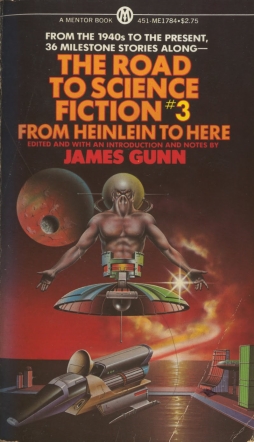 So there is a way in which the story’s a peculiar variant on the bildungsroman: this is how you mature, it says, growing into death. It’s possible to go further, I suppose, if you really wanted to, and say that Marilyn’s emergence from the cargo closet is a kind of birth, that she matures through the course of the story, and that since the story closes with her death, the whole tale is really the symbolic story of her life. I think the textual evidence for this kind of reading is sparse, but maybe this kind of story-pattern helps explain why the story works.
So there is a way in which the story’s a peculiar variant on the bildungsroman: this is how you mature, it says, growing into death. It’s possible to go further, I suppose, if you really wanted to, and say that Marilyn’s emergence from the cargo closet is a kind of birth, that she matures through the course of the story, and that since the story closes with her death, the whole tale is really the symbolic story of her life. I think the textual evidence for this kind of reading is sparse, but maybe this kind of story-pattern helps explain why the story works.
To the extent that it does work. Many readers don’t think it succeeds at what it’s trying to do at a very basic plot level. There’s a valid argument that the staging’s implausible: over time, readers have come up with any number of ways to jettison mass from the ship while keeping both humans on board. And some have also found the set-up unlikely — the lack of safety margins in the design of the ship, the lack of precautions keeping a teenager from sneaking onto a spacecraft, the fact that the pre-flight launch routine doesn’t include something as simple as ‘check the broom closet for stowaways.’ Kincaid makes the argument that these problems are more than loopholes in the story logic; they change the theme of the story completely, from ‘the universe works on relentless and unavoidable logic’ to ‘human beings can’t work out how to engineer their relationship to the universe.’
One could go further. It’s possible, I think, to argue that the bad staging of the story doesn’t just undermine its theme, but reverses it: the human characters blame an uncaring universe for their own incompetence, as a way of washing their hands of the realisation that they screwed up. Rather than face their own fallibility, they project it outwards, turning it into an iron law of the universe. The story that presents itself as a parable of how you can’t argue with Science is actually a story about how human beings will repress their awareness of their own failures.
 I find there’s actually a distinct anti-rational feel to the story’s celebration of rationality. There is a disturbing sense that the story fetishises the cold equations for their power, as well as their simplicity and brutality. One could argue that this is a fascist aesthetic, I think, but I’m more interested for the moment in another angle. That word ‘fetish’ is precisely what I’m after and I mean it in the religious sense. In this story, the implacability of the universe is a product of faith; the harshness of physics is the harshness of the Old Testament God, with every hardship a divine test. The story makes natural law an object of worship, the supreme power to which mere humans must yield up whatever is most valued. Marilyn’s willing sacrifice is a futuristic version of a child sacrificed to Moloch. She is an innocent virgin, a symbol of youth and life and spring, being killed at the demand of an angry god of the natural world. She is Iphigenia or Jephthah’s daughter, Persephone without the pomegranate seeds. Which is all fascinating at the level of myth and archetype, but does tend to undermine the story’s claim to focus on the purely rational.
I find there’s actually a distinct anti-rational feel to the story’s celebration of rationality. There is a disturbing sense that the story fetishises the cold equations for their power, as well as their simplicity and brutality. One could argue that this is a fascist aesthetic, I think, but I’m more interested for the moment in another angle. That word ‘fetish’ is precisely what I’m after and I mean it in the religious sense. In this story, the implacability of the universe is a product of faith; the harshness of physics is the harshness of the Old Testament God, with every hardship a divine test. The story makes natural law an object of worship, the supreme power to which mere humans must yield up whatever is most valued. Marilyn’s willing sacrifice is a futuristic version of a child sacrificed to Moloch. She is an innocent virgin, a symbol of youth and life and spring, being killed at the demand of an angry god of the natural world. She is Iphigenia or Jephthah’s daughter, Persephone without the pomegranate seeds. Which is all fascinating at the level of myth and archetype, but does tend to undermine the story’s claim to focus on the purely rational.
I think it’s worth mentioning, though, because I think it gets at something vital to the story’s effect — its unfairness. The story is in part a debunking of genre expectations, according to which one would expect the hero to save the teen. There is in fact a widely-repeated anecdote that says that Godwin originally had Barton figure out a way for Marilyn to live, but Campbell had him rewrite the story to end with her death; supposedly Godwin kept coming up with new ways to save her and Campbell, playing the part of universal necessity, insisted on her death. If so, there’s a sense in which Campbell was undermining a genre he’d had a large part in establishing. But if that violation of assumptions, that death when you don’t expect it, determined the way the readership responds to the story, I think it’s also true that it has an effectiveness beyond readers initiated into the conventions of mid-50s sf. Marilyn’s death seems like such an extreme punishment for such a minor transgression, one has to turn to religious taboos and high tragedy to explain the sense of disproportion.
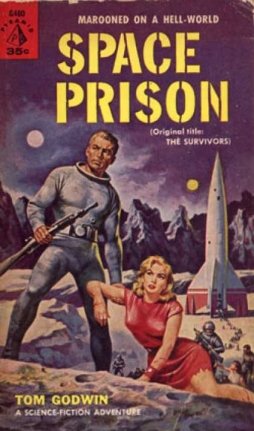 I actually find myself looking at the story as a kind of precursor of the ‘grimdark’ school of fantasy. From a certain perspective, “The Cold Equations” is grimdark avant la lettre, in the next genre over. It derives a certain amount of its power from the same twisting of genre expectations: you’re waiting for the hero to work out the gimmick that’ll save the girl. Except he doesn’t and she dies. That’s the sort of thing that seems to happen in grimdark fantasy. Heroes screw up. It has been suggested, depending on what books one assigns to the category, that female characters disproportionately seem to come out the worse for it and this is sometimes justified with appeals to ‘science’ — physics in “The Cold Equation,” history (often dubious or debateable history) in grimdark fantasy.
I actually find myself looking at the story as a kind of precursor of the ‘grimdark’ school of fantasy. From a certain perspective, “The Cold Equations” is grimdark avant la lettre, in the next genre over. It derives a certain amount of its power from the same twisting of genre expectations: you’re waiting for the hero to work out the gimmick that’ll save the girl. Except he doesn’t and she dies. That’s the sort of thing that seems to happen in grimdark fantasy. Heroes screw up. It has been suggested, depending on what books one assigns to the category, that female characters disproportionately seem to come out the worse for it and this is sometimes justified with appeals to ‘science’ — physics in “The Cold Equation,” history (often dubious or debateable history) in grimdark fantasy.
I think these stories tend to invite criticism because, consciously or not, they seem to be making a kind of ontological argument. This is the way the world really is, they say. It’s hard. It cannot be argued with. “The Cold Equations” explicitly and repeatedly contrasts the outer-space frontier, where things are stripped down to their essence and safety margins are a frippery, with the soft and luxurious Earth where Marilyn grew up. Her lack of understanding of the ‘real’ equations of life leads to her death. The frontier is what’s real and decadent Earth the place of comforting illusions.
One can of course talk about the importance of the frontier in American literature and the American psyche, but I wonder if the use of the frontier doesn’t do something else for this story. It’s possible to read the piece as a parable of a culture clash. Marilyn, an outsider, or perhaps an immigrant, comes into another place and another culture without understanding its rules and the reasons behind those rules. Acting, without her being consciously aware of it, as she would back in her homeland, she crosses a line she shouldn’t have crossed. From this perspective, the obsession with unalterable physics is simply an element of local attitudes — well-founded attitudes.
All these caveats and alternate readings noted, though, the basic argument of the story remains. Doesn’t it? Even if the specific manifestation of the scenario in the story as written doesn’t work, surely some close variant can be imagined that closes the loopholes: an ideal “Cold Equations,” the story Godwin wanted to write or thought he was writing. The idea of the story is to set up the no-win scenario (Star Trek fans, if any are still reading, may note that this phrase is familiar; I’ll be coming back to it). So let’s consider how that plays out.
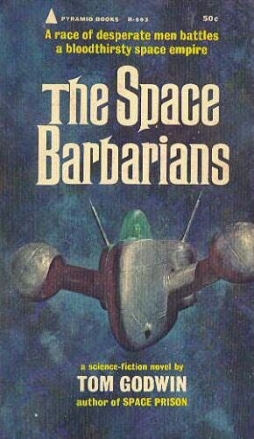 It is true, of course, that human beings can’t arge with the laws of physics. If I drop a piece of glass from a distance above a rock floor, it will fall and it will shatter. But that’s so obvious, it doesn’t need stating. And so to the extent that the story’s about the primacy of physics, it’s either patronising or pointless. There are stories to be found in what happens when people do deny these things; consider the ‘debate’ on climate change. But then that’s a complex issue, in which (so far as I can see) the very complexity of the science is allowing people to deny the scientific consensus. “The Cold Equations” presents a much simpler application of physical laws.
It is true, of course, that human beings can’t arge with the laws of physics. If I drop a piece of glass from a distance above a rock floor, it will fall and it will shatter. But that’s so obvious, it doesn’t need stating. And so to the extent that the story’s about the primacy of physics, it’s either patronising or pointless. There are stories to be found in what happens when people do deny these things; consider the ‘debate’ on climate change. But then that’s a complex issue, in which (so far as I can see) the very complexity of the science is allowing people to deny the scientific consensus. “The Cold Equations” presents a much simpler application of physical laws.
But then, as we’ve seen, the story’s easy to read as anything but open-and-shut. What happens on the ship is inevitable. But how does it come about? And is it actually an evasion to ask this question? Is it really logical to look at events in the ship as though they took place in a bubble, disconnected from any preceding chain of actions? If I drop a glass onto rock, it shatters. But why would I drop it? What set of choices leads up to that moment? Natural laws are inflexible, that’s true. But there’s always a point where somebody chooses to set those laws in motion in a specific way. Without that choice (or refusal to choose), there is no story.
The choice in “The Cold Equations” is, it seems, Marilyn sneaking onto the ship. But then that choice is conditioned by any number of other choices. Choices about the design of the ship, about the refusal to post proper warnings, even simply the choice not to make checking for stowaways part of the pre-flight routine. So maybe that basic aspect of the story doesn’t really hold up. Of course, it’s true that you can’t argue with physics. The trick is not to get into a shouting match in the first place. Perhaps one way to look at the reaction to the story is to say that it’s conditioned by where you assign blame. Was Marilyn wrong and foolish to sneak aboard ship? Or was the society as a whole wrong not to come up with some fairly basic safety precautions? Note that all the representatives of society that we get in the story are male, so again this seems to return us to the story’s dated gender politics.
Ultimately, the story aims at tragedy, and specifically the sense of tragic inevitability. Certainly there is the formal pattern of sacrifice that seems to underlie much of the most potent tragedy. But the construction of the plot and setting seem to cast that inevitability into doubt. Did Marilyn have to die? Not in the piece as written. It seems, when all is said and done, a ridiculous hole in logic to say a) violent stowaways have been known to hide out on this class of small spaceship and at the same time, b) nobody checks for stowaways before launch. Is it possible to imagine a better-constructed story that makes the point more clearly? I think so. And I’ll get into that tomorrow. (As you can now read.)
Matthew David Surridge is the author of “The Word of Azrael,” from Black Gate 14. His ongoing web serial is The Fell Gard Codices. You can find him on Facebook, or follow his Twitter account, Fell_Gard.
Is it possible to imagine a better-constructed story that makes the point more clearly?
No need to imagine it; it’s The Yearling, by Marjorie Kinnan Rawlings, which predates TCE and is superior to it in every way.
I think this often a problem with genre fiction: you subvert one particular trope only to end up introducing another. The author was subverting the received wisdom of his day (woman and children first). We see the willingness of the mc to jettison a female character as sexist. What you gonna do?
The core theme – the brutal mathematics of emotion versus pragmatism – reminds me a lot of a short story by Larry Niven, ‘How the Heroes Die’.
[…] the episode “The City on the Edge of Forever.” For reasons which I hope will soon make sense I started off yesterday by writing about the 1954 short story “The Cold Equations.” What I’m about to try to do is […]